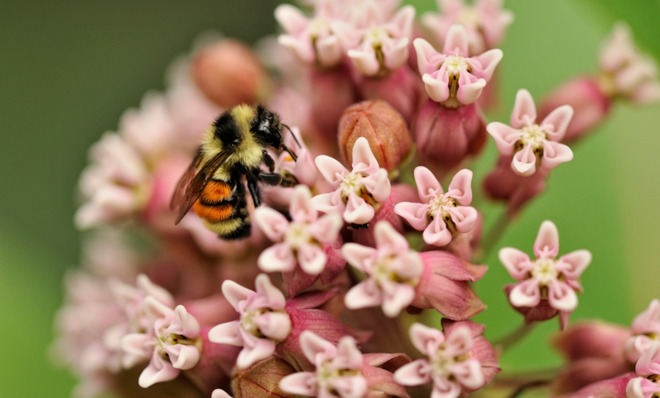The sexual battles of plants
Meet the milkweed, the plant world's craftiest Don Juan

A free daily email with the biggest news stories of the day – and the best features from TheWeek.com
You are now subscribed
Your newsletter sign-up was successful
Humans physically fight over mates, sure (see Popeye vs Bluto). Other animals also get into confrontation over mates (bears, for example). But plants? Psssh. No way, right? How do you fight when you're basically immobile and blind to your competitors?
Even though plant reproduction doesn't resemble more familiar mating rituals, plants are still sexually competitive and try to exploit pollinators like birds and insects to one up each other. Now scientists in Argentina have found what appears to be the first evidence of a plant evolving weaponry to physically fight off its competitors.
Milkweeds reproduce by attaching sacs of pollen, called pollinia, to the bodies of insects and other animals that visit their flowers. When the creature — now a pollinator — flies off and lands on another milkweed, these sacs get detached and deposited for pollination.
The Week
Escape your echo chamber. Get the facts behind the news, plus analysis from multiple perspectives.

Sign up for The Week's Free Newsletters
From our morning news briefing to a weekly Good News Newsletter, get the best of The Week delivered directly to your inbox.
From our morning news briefing to a weekly Good News Newsletter, get the best of The Week delivered directly to your inbox.
But there's only so much space on a pollinator for pollen sacs to attach to. So how do milkweeds maximize their chances of success? In some milkweed species, the pollinia can attach to each other and form a chain. But this presents a different problem: What if competitors start stacking their pollinia on top of the ones that got there first? The first plant that got theirs on board would seem to be at a disadvantage.
To secure its spot on the pollinator and ensure that it'll be the first one getting to a new plant, it would be handy for a pollinia to have a way to keep other pollen sacs from latching on. Biologist Andrea Cocucci and colleagues from the Instituto Multidisciplinario de Biología Vegetal in Cordoba, Argentina have found something just like that.
Since some tropical milkweeds have pollinia with horn-like structures on them that don't serve any obvious biological purpose, Cocucci wondered if the horns might prevent other pollinia from hitching a ride. To find out, he and his team tested to see if getting tangled up really does reduce the mating success of the first pollen sac attached to a pollinator, and if the horns did anything to improve its fortunes.
In half of the milkweeds they looked at, the first pollinia that got picked up did suffer from "spatial interference" caused by competitors using it to grab a prime spot, and took much longer to reach another plant to pollinate. Horns seem to keep the freeloaders away, though, and the pollinia that had them were less likely to have pollen from competing plants hooking on to them.
A free daily email with the biggest news stories of the day – and the best features from TheWeek.com
The horns, the scientists think, are the result of "competition for space on pollinators and for access to fertilization opportunities" and a weapon used to directly attack competitors and gain an edge in that contest.
"Because the horns on the pollinia of milkweeds are engaged in male physical struggles," they write, "they represent the botanical equivalent of the horns in many male vertebrates, such as bucks and insects."
Wherever there's a weapon in nature, a countering one can't be far off. Cocucci and his team say that if the horns are there to fend off rival pollen, they expect to see an evolutionary arms race taking place "with, on one side, defensive weapons on the attachment sites and, on the other, the breaching of the defense by the clasping site." They hope that future studies will explore any tit-for-tat competition in the milkweed's surprisingly cutthroat sex lives.
-
 James Van Der Beek obituary: fresh-faced Dawson’s Creek star
James Van Der Beek obituary: fresh-faced Dawson’s Creek starIn The Spotlight Van Der Beek fronted one of the most successful teen dramas of the 90s – but his Dawson fame proved a double-edged sword
-
 Is Andrew’s arrest the end for the monarchy?
Is Andrew’s arrest the end for the monarchy?Today's Big Question The King has distanced the Royal Family from his disgraced brother but a ‘fit of revolutionary disgust’ could still wipe them out
-
 Quiz of The Week: 14 – 20 February
Quiz of The Week: 14 – 20 FebruaryQuiz Have you been paying attention to The Week’s news?